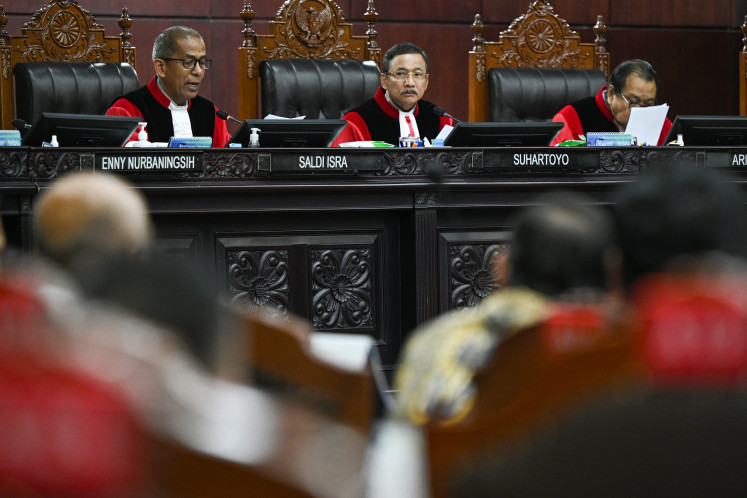Popular Reads
Top Results
Can't find what you're looking for?
View all search resultsPopular Reads
Top Results
Can't find what you're looking for?
View all search resultsBusinesses urged to go green
Jakarta can save hundreds of millions of kilowatt-hours (kWh) of electricity per year by reducing energy use in the capital's commercial building sector, says a member of Indonesia's Green Building Council (GBCI)
Change text size
Gift Premium Articles
to Anyone
J
akarta can save hundreds of millions of kilowatt-hours (kWh) of electricity per year by reducing energy use in the capital's commercial building sector, says a member of Indonesia's Green Building Council (GBCI).
The deputy chair of the council, Rana Yusuf Nasir, said recently that businesses could reduce 7 to 11 percent of their energy use by tuning up appliances, downsizing and upgrading performances with no extra cost. He also added that energy use could be reduced by 17 to 30 percent at a medium cost.
In an analysis carried out in 2004, Rana said that Jakarta had around 10 million square meters of commercial building that consumed around 2,500 million kWh per year. By saving 15 percent in energy use, 375 million kWh per year can be saved.
He added that it would also reduce CO2 emissions by 303,720 tons per year or an equivalent of having 475,000 trees.
Naning S. Adiningsih Adiwoso, chairwoman of the council said the essence of green buildings was efficiency.
"Green buildings have to use water and air conditioning efficiently. Such buildings should use environmentally friendly materials. It would be better if they created zero carbon by using biodegradable, recyclable, and reusable materials," she said.
The council held a dinner discussion featuring Arab Hoballah, the chief of sustainable consumption at the United Nations Environment Programme (UNEP), which was attended by businesspeople in the construction and property industry.
"Cities consume 2 percent of the land, but consume 75 percent of resources. So if you want to make a difference, let's concentrate on cities," Hoballah said.
"The building sector can contribute to energy reduction.
"The data shows very clearly that if there is one sector where we can make a big difference it's in the building industry," he said.
Hoballah said the building sec-tor currently contributed to greenhouse gases.
"The building sector consumes 40 percent of energy, 30 percent of mineral resources and 20 percent of water," Hoballah said.
But the sector also has the biggest chance of adjusting to and reducing energy consumption, which in the end could reduce the impacts of greenhouse gas emissions.
He said the UNEP was working to improve the metrics for energy efficiency for buildings and that he would also push to include the building sector at the United Nations Climate Change Conference in Copenhagen, Denmark this month.
Hoballah said that to make this work, stakeholders needed to be presented with the "stick, carrot and tambourine".
He said that policies related to energy efficiency and greenhouse gas emissions for buildings were not adequate.
Economic incentives in the form of loans from the banking sector should be created as well as information about the environmental importance of buildings he said.
"You cannot do it if there is no market instrument and you cannot do it without information," he said.
Naning said that in Jakarta, there was yet to be any buildings that were 100 percent green.
"That's why we are pushing for this and have invited the business community to discuss environmental issues and simple ways to reduce energy consumption," she said.










